- Home
- Fergus Hume
The Mystery of a Hansom Cab Page 5
The Mystery of a Hansom Cab Read online
Page 5
‘No, I have not,’ he said with a yawn. ‘I have been up the country for a few days and only arrived back this evening, so I have not seen him for over a week. Why do you ask?’
The detective did not answer, but stood looking at the young man before him in a thoughtful manner.
‘I hope,’ said Mr Moreland nonchalantly, ‘I hope you will know me again my friend, but I didn’t know Whyte had started a lunatic asylum during my absence—who are you?’
Mr Gorby came forward and stood under the gas light. ‘My name is Gorby, sir, and I am a detective,’ he said quietly.
‘Ah! indeed,’ said Moreland coolly looking him up and down. ‘What has Whyte been doing, running away with someone’s wife, eh? I know he has little weaknesses of that sort.’
Gorby shook his head.
‘Do you know where Mr Whyte is to be found?’ he asked cautiously.
Moreland laughed.
‘Not I, my friend,’ said he lightly. ‘I presume he is somewhere about here, as these are his headquarters. What’s he been doing? Nothing that can surprise me, I assure you—he was always an erratic individual, and—’
‘He paid reg’lar,’ interrupted Mrs Hableton, pursing up her lips.
‘A most enviable reputation to possess,’ answered the other with a sneer, ‘and one I’m afraid I’ll never enjoy. But why all this questioning about Whyte? What’s the matter with him?’
‘He’s dead!’ said Gorby, abruptly.
All Moreland’s nonchalance vanished on hearing this, and he started up out of his chair.
‘Dead,’ he repeated mechanically. ‘What do you mean?’
‘I mean that Mr Oliver Whyte was murdered in a hansom cab.’
Moreland stared at the detective in a puzzled sort of way, and passed his hand across his forehead.
‘Excuse me, my head is in a whirl,’ he said, as he sat down again. ‘Whyte murdered! He was all right when I left him nearly two weeks ago.’
‘Haven’t you seen the papers?’ asked Gorby.
‘Not for the last two weeks,’ replied Moreland. ‘I have been up country, and it was only on arriving back in town tonight that I heard about the murder at all, as my landlady gave me a garbled account of it, but I never for a moment connected it with Whyte, and came down here to see him, as I had agreed to do when I left. Poor fellow! Poor fellow! Poor fellow!’ and much overcome, he buried his face in his hands.
Mr Gorby was touched by his evident distress, and even Mrs Hableton permitted a small tear to roll down one hard cheek as a tribute of sorrow and sympathy. Presently Moreland raised his head, and spoke to Gorby in a husky tone.
‘Tell me all about it,’ he said, leaning his cheek on his hand. ‘Everything you know.’
He placed his elbows on the table, and buried his face in his hands again, while the detective sat down and related all that he knew about Whyte’s murder. When it was done he lifted up his head, and looked sadly at the detective.
‘If I had been in town,’ he said, ‘this would not have happened, for I was always beside Whyte.’
‘You knew him very well, sir,’ said the detective in a sympathetic tone.
‘We were like brothers,’ replied Moreland, mournfully. ‘I came out from England in the same steamer with him, and used to visit him constantly here.’
Mrs Hableton nodded her head to imply that such was the case.
‘In fact,’ said Mr Moreland after a moment’s thought, ‘I believe I was with him the night he was murdered.’
Mrs Hableton gave a slight scream and threw her apron over her face, but the detective sat unmoved, though Moreland’s last remark had considerably startled him.
‘What’s the matter?’ said Moreland, turning to Mrs Hableton. ‘Don’t be afraid, I didn’t kill him—no—but I met him last Thursday week, and I left for the country on Friday morning at half past six.’
‘And what time did you meet Whyte on Thursday night?’ asked Gorby.
‘Let me see,’ said Moreland, crossing his legs and looking thoughtfully up to the ceiling, ‘it was about half past nine o’clock. I was in the Orient Hotel, in Bourke Street. We had a drink together, and then went up the street to a hotel in Russell Street, where we had another. In fact,’ said Moreland, coolly, ‘we had several other drinks.’
‘Brutes!’ muttered Mrs Hableton, below her breath.
‘Yes,’ said Gorby, placidly. ‘Go on.’
‘Well of—it’s hardly the thing to confess it,’ said Moreland, looking from one to the other with a pleasant smile, ‘but in a case like this, I feel it my duty to throw all social scruples aside. We both got very drunk.’
‘Ah! Whyte was, as we know, drunk when he got into the cab—and you—?’
‘Was not quite so bad as Whyte,’ answered the other. ‘I had my senses about me. I fancy he left the hotel some minutes before one o’clock on Friday morning.’
‘And what did you do?’
‘I remained in the hotel. He left his overcoat behind him, and I picked it up and followed him shortly afterwards, to return it. I was too drunk to see which direction he had gone in, and stood leaning against the hotel door in Bourke Street with the coat in my hand. Then someone came up, and, snatching the coat out of my hand, made off with it, and the last thing I remember was shouting out: “Stop thief!” Then I must have fallen down, for next morning I was in bed with all my clothes on, and they were very muddy. I got up and left town for the country by the six-thirty train, so I knew nothing about the matter until I came back to Melbourne tonight. That’s all I know.’
‘And you had no impression that Whyte was watched that night.’
‘No, I had not,’ answered Moreland frankly. ‘He was in pretty good spirits, though he was put out at first.’
‘What was the cause of his being put out?’
Moreland arose, and going to a side table, brought Whyte’s album, which he laid on the table and opened in silence. The contents were very much the same as the photographs in the room, burlesque actresses and ladies of the ballet predominating, but Mr Moreland turned over the pages till nearly the end, when he stopped at a large cabinet photograph, and pushed the album towards Mr Gorby.
‘That was the cause,’ he said.
It was the portrait of a charmingly pretty girl, dressed in white, with a sailor hat on her fair hair, and holding a lawn tennis racquet. She was bending half forward, with a winning smile, and in the background was a mass of some tropical plants. Mrs Hableton gave a cry of surprise at seeing this.
‘Why, it’s Miss Frettlby,’ she said. ‘How did he know her?’
‘Knew her father—letter of introduction, and all that sort of thing,’ said Mr Moreland, glibly.
‘Ah! indeed,’ said Mr Gorby slowly. ‘So Mr Whyte knew Mark Frettlby, the millionaire; but how did he obtain a photograph of the daughter?’
‘She gave it to him,’ said Moreland. ‘The fact is, Whyte was very much in love with Miss Frettlby.’
‘And she—’
‘Was in love with someone else,’ finished Moreland. ‘Exactly! Yes, she loved a Mr Brian Fitzgerald, to whom she is now engaged. He was mad on her, and Whyte and he used to quarrel over the young lady desperately.’
‘Indeed!’ said Mr Gorby. ‘And do you know this Mr Fitzgerald?’
‘Oh, dear, no!’ answered the other coolly. ‘Whyte’s friends were not mine. He was a rich young man who had good introductions. I am only a poor devil on the outskirts of society, trying to push my way in the world.’
‘You know his personal appearance, of course,’ observed Mr Gorby.
‘Oh, yes, I can tell you that,’ said Moreland. ‘In fact, he’s not at all unlike me, which I take to be rather a compliment, as he is said to be good-looking. He is tall, rather fair, talks in a bored sort of manner, and is altogether what one would call a heavy swell; but you must have seen him,’ he went on, turning to Mrs Hableton, ‘he was here three or four weeks ago, Whyte told me.’
‘Oh, that was Mr Fitzgeral
d, was it?’ said Mrs Hableton, in surprise. ‘Yes, he was rather like you; and so the lady they quarrelled over must have been Miss Frettlby.’
‘Very likely,’ said Moreland rising. ‘Well, I’m off, here’s my address,’ putting a card into Gorby’s hand. ‘I’m glad to be of any use to you in the matter, as Whyte was my dearest friend, and I’ll do all in my power to help you to find out the murderer.’
‘I don’t think that is a very difficult matter,’ said Gorby slowly.
‘Oh, you have your suspicions?’ said Moreland, looking at him.
‘I have.’
‘Then who do you think murdered Whyte?’
Mr Gorby paused a moment, and then said deliberately, ‘I have an idea—but I am not certain—when I am certain, I’ll speak.’
‘You think Fitzgerald killed my friend,’ said Moreland. ‘I see it in your face.’
Mr Gorby smiled. ‘Perhaps,’ he said ambiguously. ‘Wait till I’m certain.’
CHAPTER SEVEN
A WOOL KING
The old Greek story of Midas, who turned everything he touched into gold, is truer than most people suppose. Medieval superstition changed the human being who possessed such a power, into the philosophers’ stone, after which so many alchemists went hunting in the dark ages, but we of the nineteenth century have given the miracle of changing everything into gold by the touch, back to its human possessor. We, however, do not ascribe it either to Greek deity or medieval superstition, but simply call it luck, and he who possesses luck is a happy man, or, at least, he ought to be. Wiseacres who may read this will, of course, repeat the stale proverb, that ‘Riches do not bring happiness,’ but luck means more than riches—it means happiness in everything which the fortunate possessor may choose to go in for. If he goes into a speculation, it turns out well; if he marries a wife, she is sure to be everything that can be desired; if he aspires to a position, social or political, he attains it with ease—worldly wealth, domestic happiness, and good position, all these belong to the men who have luck.
Mark Frettlby was one of these fortunate individuals, and his luck was proverbial throughout Australia. If there was any speculation for which Mark Frettlby went in, other men would be sure to follow, and in every case the result turned out as well, and in many cases even better than they expected. He had come out in the early days of the colony with comparatively little money, but his great perseverance and never-failing luck had soon changed his hundreds into thousands, and now at the age of fifty-five he did not himself know the extent of his income. He had large stations scattered all over the Colony of Victoria, which brought him in a splendid income. A charming country house, where at certain seasons of the year, he dispensed hospitality to his friends, like the lord of an English manor, and a magnificent town house down in St Kilda, which would not have been unworthy of Park Lane.
Nor were his domestic relations less happy—he had a charming wife, who was one of the best known and most popular ladies of Melbourne, and an equally charming daughter, who, being both pretty and an heiress, naturally attracted crowds of suitors. But Madge Frettlby was capricious, and refused innumerable offers. Being an extremely independent young person with a mind of her own, as she had not yet seen anyone she could love, she decided to remain single, and with her mother continued to dispense the hospitality of the mansion at St Kilda. But the fairy prince comes to every woman, even if she has to wait a hundred years like the Sleeping Beauty, and in this case he arrived at the appointed time.
Ah! what a delightful prince he was, tall, handsome, and fair-haired, who came from Ireland, and answered to the name of Brian Fitzgerald. He had left behind him in the old country, a ruined castle and a few acres of barren land, inhabited by discontented tenants who refused to pay the rent, and talked darkly about the Land League, and other agreeable things. Under these circumstances with no rent coming in, and no prospect of doing anything in the future, Brian had left the castle of his forefathers to the rats and the family Banshee, and came out to Australia to make his fortune. He brought letters of introduction to Mark Frettlby, and that gentleman having taken a fancy to him, assisted him by every means in his power. Under Frettlby’s advice Brian bought a station, and to his astonishment, in a few years found himself growing rich. The Fitzgeralds had always been more famous for spending than for saving, and it was an agreeable surprise to their latest representative to find the money rolling in instead of out. He began to indulge in castles in the air concerning that other castle in Ireland, with the barren acres and discontented tenants. In his mind’s eye he saw the old place rise up in all its pristine splendour out of its ruins; he saw the barren acres well cultivated, and the tenants happy and content—he was rather doubtful on this latter point, but with the rash confidence of eight and twenty, determined to do his best to perform even the impossible. Having built and furnished his castle in the air, Brian naturally thought of giving it a mistress, and this time actual appearance took the place of vision.
He fell in love with Madge Frettlby, and having decided in his own mind that she and none other was fitted to grace the visionary halls of his renovated castle, he watched his opportunity, and declared himself. She, woman-like, coquetted with him for some time, but at last, unable to withstand the impetuosity of her Irish lover, confessed in a low voice, with a pretty smile on her face, that she could not live without him. Whereupon—well—lovers being of a conservative turn of mind, and accustomed to observe the traditional forms of wooing, the result can easily be guessed. Brian hunted all over the jewellers’ shops in Melbourne with lover-like assiduity, and having obtained a ring wherein were set these turquoise stones as blue as his own eyes, he placed it on her slender finger, and at last felt that his engagement was an accomplished fact. This being satisfactorily arranged, he next proceeded to interview the father, and had just screwed his courage up to the awful ordeal, when something occurred which postponed the interview indefinitely.
Mrs Frettlby was out driving, when the horses took fright and bolted. The coachman and groom both escaped unhurt, but Mrs Frettlby was thrown out and killed instantaneously. This was the first really great trouble which had fallen on Mark Frettlby, and he seemed to be stunned by it. Shutting himself up in his room he refused to see anyone, even his daughter, and appeared at the funeral with a white and haggard face, which shocked everyone. When everything was over, and the body of the late Mrs Frettlby was consigned to the earth, with all the pomp and ceremony which money could give, the bereaved husband drove home, and resumed his old life. But he was never the same again. His face which had always been so genial and bright, became stern and sad—he seldom smiled, and when he did, it was a faint wintry smile which seemed mechanical. His whole heart seemed centred in his daughter, she became the sole mistress of the St Kilda mansion, and her father idolised her. She seemed to be the one thing left to him which gave him an interest in life, and had it not been for her bright presence constantly near him, Mark Frettlby would have wished himself lying beside his dead wife in the quiet grave yard, wherein there is no trouble or care.
After a time had elapsed, Brian again resolved to ask Mr Frettlby for the hand of his daughter, when for the second time fate interposed. This time it was a rival suitor who made his appearance, and Brian’s hot Irish temper rose when he saw another Richmond in the field. The gentleman in question was a Mr Oliver Whyte, who had come out from England a few months previously, and brought a letter of introduction to Mr Frettlby, who received him hospitably as was his custom, and Whyte soon made himself perfectly at home in the St Kilda mansion.
Brian took a dislike to the newcomer the first time he saw him, for Mr Fitzgerald was a student of Lavater, and prided himself on his reading of character. His opinion of Whyte was anything but flattering to that gentleman, for in spite of his handsome face and suave manners, both Brian and Madge felt the same repulsion towards him, as they would have to a snake.
Mr Whyte, however, with true diplomacy, affected not to notice the cold way in wh
ich Madge received him, and began to pay marked attention to her, much to Brian’s disgust. At last he asked her to be his wife, and notwithstanding her prompt refusal, spoke to Mr Frettlby on the subject. Much to the daughter’s astonishment, that gentleman consented to Whyte’s paying his addresses to Madge, and told her that he wished her to consider the young man’s proposal favourably. In spite of all Madge could say, he refused to alter his decision, and Whyte feeling himself safe, began to treat Brian with an insolence which was highly galling to Fitzgerald’s proud nature. He called on Whyte at his lodgings, and after a violent quarrel with him had left the house, vowing to kill Whyte, should he marry Madge Frettlby.
Fitzgerald went along to Mr Frettlby that same night, and had an interview with him. He confessed that he loved Madge, and that his love was returned, so when Madge added her entreaties to Brian’s, Mr Frettlby found himself unable to withstand the combined forces and gave his consent to their engagement. Whyte was absent in the country for the next few days after his stormy interview with Brian, and it was only on his return that he learnt that Madge was engaged to his rival. He saw Mr Frettlby on the subject, and having learnt from his own lips that such was the case, he left the house at once, and swore that he would never enter it again. He little knew how prophetic his words were, for on that same night he met his death in the hansom cab. He had passed out of the life of both the lovers, and they, glad that he troubled them no more, never suspected for a moment that the body of the unknown man found in Royston’s cab was that of Oliver Whyte.
About two weeks after Whyte’s disappearance Mr Frettlby gave a dinner party in honour of his daughter’s birthday. It was a delightful evening, and the wide french windows which led on to the verandah were open, letting in a gentle breeze, blowing with a fresh salt odour, from the ocean. Outside, there was a kind of screen of tropical plants, and through the tangle of the boughs, the guests, seated at the table, could just see the waters of the bay glittering like silver in the pale moonlight. Brian was seated opposite to Madge, and every now and then he caught a glimpse of her bright face behind the great silver epergne, filled with fruit and flowers, which stood in the centre of the table. Mark Frettlby was at the head of the table, and appeared in very good spirits, for his stern features were somewhat relaxed, and he drank more wine than usual.

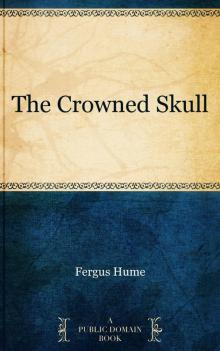 The Crowned Skull
The Crowned Skull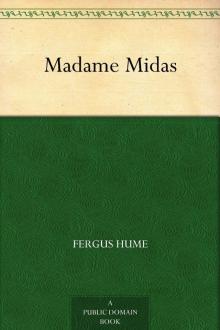 Madame Midas
Madame Midas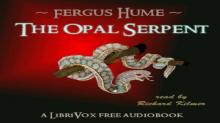 The Opal Serpent
The Opal Serpent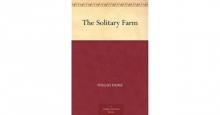 The Solitary Farm
The Solitary Farm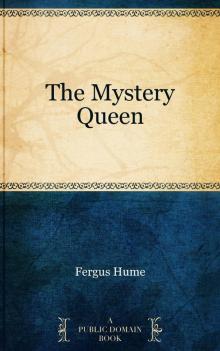 The Mystery Queen
The Mystery Queen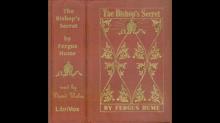 The Bishop's Secret
The Bishop's Secret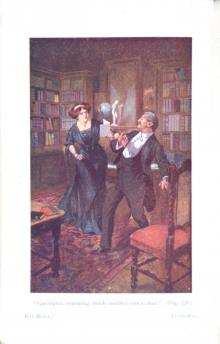 Red Money
Red Money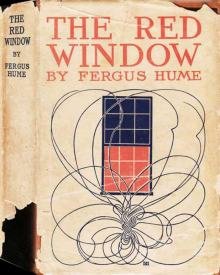 The Red Window
The Red Window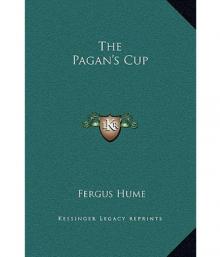 The Pagan's Cup
The Pagan's Cup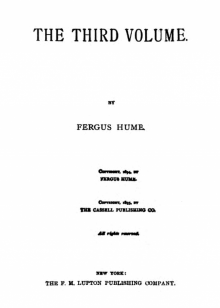 The Third Volume
The Third Volume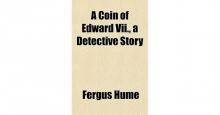 A Coin of Edward VII: A Detective Story
A Coin of Edward VII: A Detective Story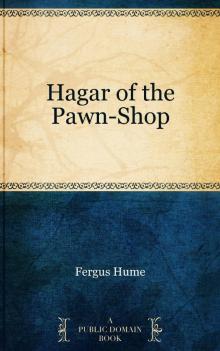 Hagar of the Pawn-Shop
Hagar of the Pawn-Shop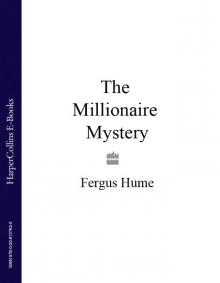 The Millionaire Mystery
The Millionaire Mystery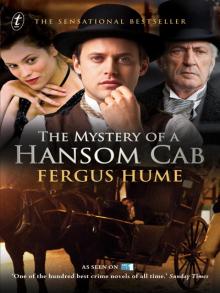 The Mystery of a Hansom Cab
The Mystery of a Hansom Cab